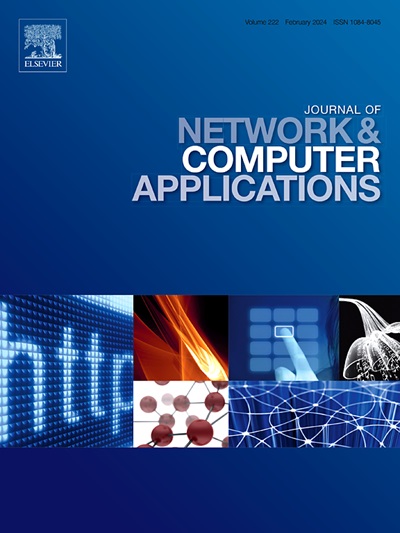MDQ:面向 SDN 多路径路由的、意识到 QoS-拥塞的深度强化学习方法
IF 7.7
2区 计算机科学
Q1 COMPUTER SCIENCE, HARDWARE & ARCHITECTURE
引用次数: 0
摘要
网络中链路利用率过高的挑战依然存在,这促使人们开发了多路径策略和流量重路由等负载平衡方法。然而,传统的基于规则的启发式方法难以动态适应网络变化。这导致了复杂的模型和漫长的收敛时间,不适合各种 QoS 需求,尤其是对时间敏感的应用。现有的路由选择方法通常会导致特定类型的流量超载链路或普遍拥塞、收敛延迟过长以及可扩展性挑战。为了解决这些问题,我们为软件定义网络(MDQ)中的多路径路由提出了一种考虑到 QoS-拥塞的深度强化学习方法。利用深度强化学习,MDQ 可以智能地选择最佳多路径,并根据流量需求分配流量。我们结合链路和队列指标设计了一个多目标函数,以建立高效的路由策略。此外,我们还将拥塞严重程度指数纳入学习过程,并结合流量分类阶段来处理小象流量,确保充分满足不同的服务等级要求。通过一个基于 RYU-Docker 的 Openflow 框架,该框架集成了实时 QoS 监控、DNC 分类器和在线路由,结果表明与最先进的算法相比,延迟降低了 19%-22%,在网络动态的各种情况下都表现出了强大的可靠性。本文章由计算机程序翻译,如有差异,请以英文原文为准。
MDQ: A QoS-Congestion Aware Deep Reinforcement Learning Approach for Multi-Path Routing in SDN
The challenge of link overutilization in networking persists, prompting the development of load-balancing methods such as multi-path strategies and flow rerouting. However, traditional rule-based heuristics struggle to adapt dynamically to network changes. This leads to complex models and lengthy convergence times, unsuitable for diverse QoS demands, particularly in time-sensitive applications. Existing routing approaches often result in specific types of traffic overloading links or general congestion, prolonged convergence delays, and scalability challenges. To tackle these issues, we propose a QoS-Congestion Aware Deep Reinforcement Learning Approach for Multi-Path Routing in Software-Defined Networking (MDQ). Leveraging Deep Reinforcement Learning, MDQ intelligently selects optimal multi-paths and allocates traffic based on flow needs. We design a multi-objective function using a combination of link and queue metrics to establish an efficient routing policy. Moreover, we integrate a congestion severity index into the learning process and incorporate a traffic classification phase to handle mice-elephant flows, ensuring that diverse class-of-service requirements are adequately addressed. Through an RYU-Docker-based Openflow framework integrating a Live QoS Monitor, DNC Classifier, and Online Routing, results demonstrate a 19%–22% reduction in delay compared to state-of-the-art algorithms, exhibiting robust reliability across diverse scenarios of network dynamics.
求助全文
通过发布文献求助,成功后即可免费获取论文全文。
去求助
来源期刊

Journal of Network and Computer Applications
工程技术-计算机:跨学科应用
CiteScore
21.50
自引率
3.40%
发文量
142
审稿时长
37 days
期刊介绍:
The Journal of Network and Computer Applications welcomes research contributions, surveys, and notes in all areas relating to computer networks and applications thereof. Sample topics include new design techniques, interesting or novel applications, components or standards; computer networks with tools such as WWW; emerging standards for internet protocols; Wireless networks; Mobile Computing; emerging computing models such as cloud computing, grid computing; applications of networked systems for remote collaboration and telemedicine, etc. The journal is abstracted and indexed in Scopus, Engineering Index, Web of Science, Science Citation Index Expanded and INSPEC.
 求助内容:
求助内容: 应助结果提醒方式:
应助结果提醒方式:


